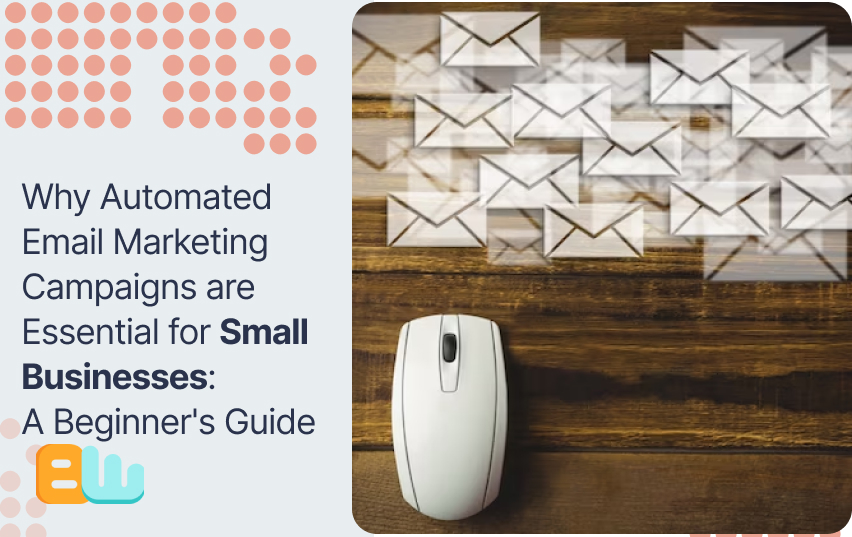
Running a small business can be challenging. Staying ahead of your competitors is crucial whether you are just starting or have been in the game for a while. One of the best ways to do this is through automated email marketing campaigns. But what exactly is email marketing? And how can it benefit your business? In this beginner’s guide, we will take you through the basics of email marketing and explain how automation can help save time and money while boosting engagement and sales. We will also cover critical factors to consider when implementing an automated email marketing campaign, including identifying your target audience, creating personalized content, and choosing the right platform for your business. So sit back, relax, and prepare to take your small business to new heights with automated email marketing!
Understanding Email Marketing
Email marketing fosters direct communication with potential customers, enabling the establishment of strong relationships and customer retention. Tailored emails can be sent based on user behavior and lead magnets, providing value and relevance. This marketing strategy significantly aids small businesses in lead generation, offering a vital avenue for building connections with the right audience. By harnessing the power of email marketing, businesses can strategically promote helpful content, products, and services, encouraging the desired action from recipients.
The Emergence of Email Marketing
The evolution of email marketing as a channel for direct communication has been remarkable. From automated email sequences to drip campaigns, it has transformed how businesses interact with their audience. Email marketing tools enhance customer relationships by delivering personalized and timely communications. The emergence of email marketing has also given rise to new subscriber welcome emails, creating opportunities for businesses to make a lasting first impression. Email marketing focuses on building relationships and trust, offering valuable and helpful content to subscribers, and prompting them to take the desired action.
Email Marketing vs Traditional Marketing
When it comes to marketing, email marketing complements traditional marketing efforts by providing a cost-effective channel for businesses. Unlike traditional marketing, email marketing focuses on building relationships and delivering relevant content. It allows for personalized content, a hallmark of effective email marketing. While conventional marketing relies on a broader audience reach, email marketing emphasizes relationship-building and engaging with the right people. This makes it a valuable tool for small businesses looking to build connections and drive engagement through targeted and meaningful communication.
Advantages of Automated Email Marketing for Small Businesses
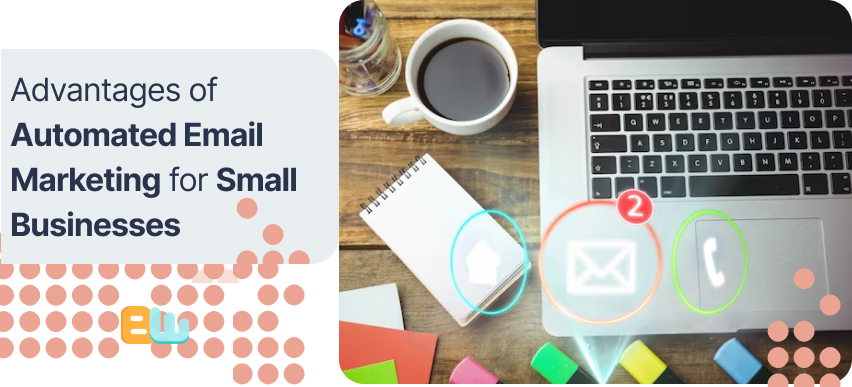
Automated email marketing is a game-changer for small businesses, saving invaluable time and resources. Engaging potential customers through email automation tools enhances customer base growth and lead generation. The ability to recommend products through marketing emails is priceless, while timely relevant emails can be sent using advanced email platforms. These advantages enhance customer engagement, improve efficiency, and boost sales and revenue. Additionally, monitoring and analyzing results helps businesses understand the impact of their email marketing efforts, all while saving time and money. Automated email marketing is a powerful tool for small companies to connect with their audience and drive the desired action.
Enhancing Customer Engagement
Enhancing customer engagement is vital for small businesses, and automated email marketing is crucial. Automated email marketing enhances customer engagement by delivering relevant emails, building relationships, and facilitating open communication with customers. Personalizing content increases customer engagement, leading to effective lead generation through targeted strategies. This makes stronger connections with existing customers and attracts potential leads, fostering business growth. Leveraging an email platform for creating and sending these marketing emails ensures that the content reaches the target audience at the right time, compelling them to take the desired action. Incorporating NLP terms like “marketing emails,” “email platform,” and “customer engagement” enhances the relevance of the content.
Improving Efficiency and Productivity
Efficiency in marketing efforts is enhanced by automated email marketing tools, benefiting small businesses through streamlined marketing campaigns. The use of automated email templates aids in improving productivity, while email automation tools assist in cart abandonment recovery, further enhancing productivity. By leveraging efficient email marketing strategies, small businesses can optimize their marketing efforts and achieve better results. The software for automated email marketing simplifies the process, allowing small companies to focus on creating helpful content for their audience. This, in turn, leads to improved productivity and better engagement with potential customers, ultimately contributing to business growth and success.
Boosting Sales and Revenue
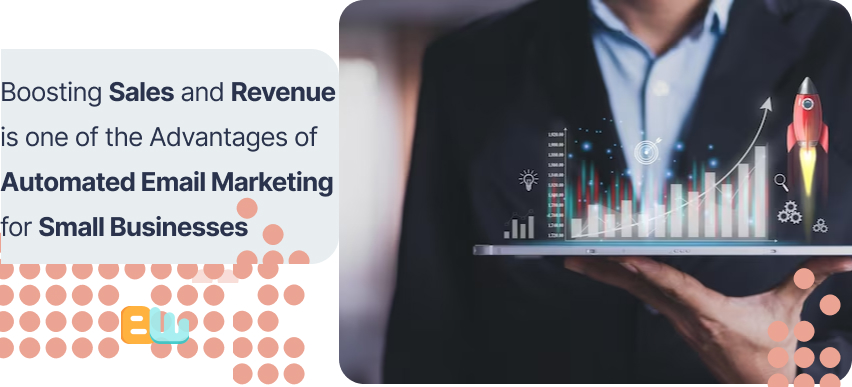
Automated email marketing campaigns drive sales by delivering relevant content to the target audience. Small businesses benefit from effective product launches and b testing, contributing to revenue growth. By improving conversion rates and enhancing the sales funnel, email marketing automation proves to be a valuable tool for small businesses. It facilitates the desired action from customers, thereby boosting sales and revenue. Businesses, especially e-commerce businesses, can use email platforms to create helpful content to engage customers. Cart emails and first emails are essential in guiding potential customers through shopping, eventually leading to increased sales.
Reach More People with Automation
Automation makes reaching a wider audience through email marketing possible, benefiting small businesses. It aids in the expansion of mailing lists and reaching potential customers efficiently. Utilizing email marketing tools, small businesses can effectively reach more people through automation. Automation also plays a crucial role in lead generation and promoting new products, contributing to the growth of small businesses. Small businesses can leverage lead generation and product promotion by incorporating automated email marketing efforts while expanding their reach.
Monitor and Analyze Your Results

Automated email marketing platform tools make monitoring and analyzing marketing campaigns for small businesses more accessible. Through email marketing efforts, small businesses can analyze open rates and customer retention while monitoring the customer journey and user behavior. This analysis is crucial for improving conversion rates and developing effective marketing strategies. With the help of automated email marketing software, small businesses can track the benefits of their email marketing efforts, ultimately leading to better-informed decision-making and improved campaign performance.
Save Time and Money
Small businesses benefit from automated email marketing tools by saving time and resources in marketing efforts. These tools enable the automation of email content creation, allowing small businesses to focus on other essential tasks. Additionally, using automated email marketing services leads to cost savings and improved efficiency for small businesses. By utilizing such tools, small businesses can invest their resources strategically, thus maximizing their return on investment. The ability to save time and money is a significant advantage of automated email marketing for small businesses, contributing to their overall productivity and success.
Differentiating between Email Marketing and Marketing Automation
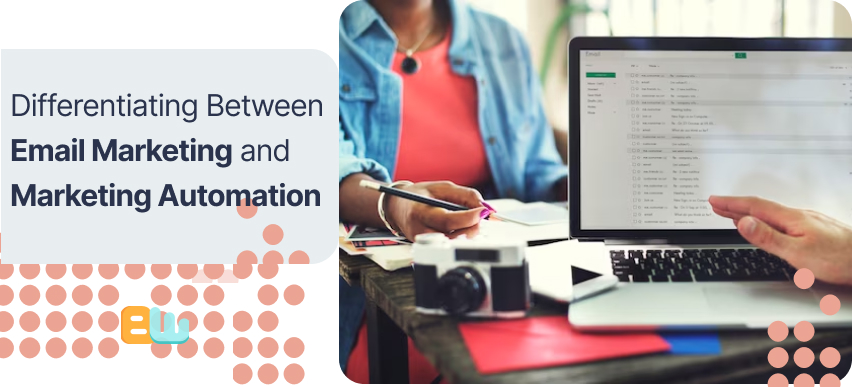
Understanding the difference between email marketing and marketing automation is essential for a successful strategy. Email marketing is ideal for direct customer communication, while marketing automation implements behavior-based email sequences. It’s crucial to recognize the unique roles of each and deploy them based on your business needs. Email marketing ensures personalized communication, while marketing automation enables the automated delivery of targeted content. By leveraging both effectively, businesses can create a cohesive and impactful strategy that drives engagement and conversions.
The Fundamental Differences
When comparing email marketing and marketing automation, it’s essential to understand their fundamental differences. Email marketing primarily sends promotional content to a mailing list, targeting a broad audience with one-time campaigns. On the other hand, marketing automation streamlines tasks and nurtures leads with personalized content, tailoring communication for ongoing engagement. Additionally, marketing automation allows for lead scoring and delivering relevant content based on user behavior, providing a more targeted approach than traditional email marketing. Understanding these distinctions is crucial in determining the most effective strategy for reaching and engaging your audience.
When to Use Email Marketing and When to Use Marketing Automation
Utilize email marketing for timely promotions, product launches, and newsletters while employing marketing automation for lead nurturing, behavior-based emails, and drip campaigns. Email marketing is suited for broadcast-style communication, whereas marketing automation allows for personalized content—leverage email marketing to build customer relationships and use marketing automation for lead generation. Recognize the transition from email marketing to marketing automation as customer relationships progress. By understanding when to switch between the two, you can optimize your communication strategy effectively.
Key Factors to Consider in Implementing Automated Email Marketing
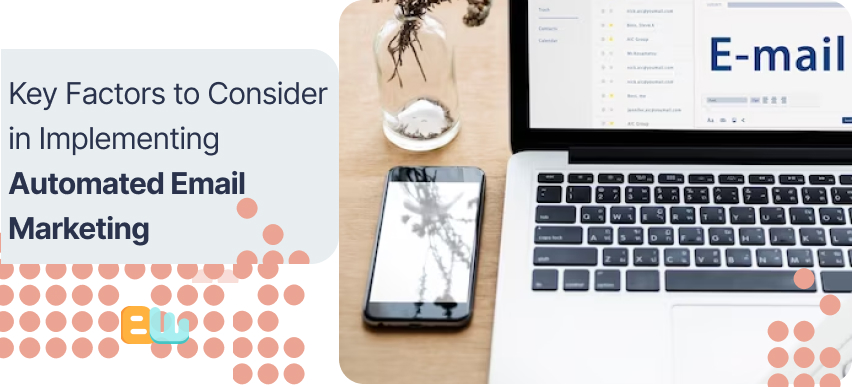
Understanding your audience and segmenting your email list is crucial. Tailor personalized content to cater to different segments. Choose an email automation platform that aligns with your business needs. Utilize automation tools to streamline marketing efforts. Identify the right moment to send relevant emails based on user behavior. These factors ensure the effective implementation of automated email marketing, enhancing customer engagement and improving efficiency and productivity.
Identifying your target audience and segmenting your email list
Identifying your audience involves understanding their demographic and behavioral traits. Segment your email list based on subscriber preferences, location, and purchase history to tailor content that resonates with specific segments. Implement lead magnets to attract potential customers, grow your list, and employ email sequences to guide new subscribers through the customer journey. Utilize social media and landing pages to attract subscribers and send the first email to engage them. Marketing emails should be optimized with helpful content, employing A/B testing and an email platform for desired action. This approach mainly benefits e-commerce businesses, helping them target cart abandonment with cart emails to encourage desired action.
Creating personalized and relevant content for different segments
Crafting email content that resonates with the diverse interests and preferences of each segmented group is crucial. Utilizing product recommendations and tailored content ensures engagement across different audience segments. Implementing b testing enables optimizing email content based on audience response, enhancing relevance. Leveraging dynamic content and email templates allows for personalized communication at scale, catering to individual preferences. Effective subject lines capture the attention of specific audience segments, driving higher open rates and engagement.
Choosing the right email automation platform for your business
When choosing an email automation platform for your business, evaluating features, scalability, and pricing across various options is essential. Seamless integration with your business processes is crucial, as is considering the ease of use and customer support offered. Exploring free plan options and trial periods allows you to test the platform before committing. Opt for a platform that supports effective lead generation and conversion rate optimization. This ensures that the chosen platform aligns with your goals for social media integration, landing pages, marketing emails, and b testing. The selected platform should also facilitate creating and sending valuable content, personalized shopping cart emails, and first emails that prompt the desired action.
Overcoming Challenges in Automated Email Marketing
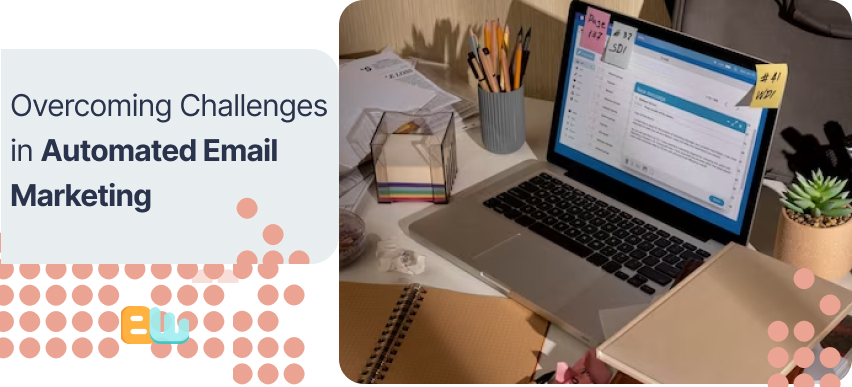
Addressing privacy and consent issues involves obtaining explicit permission from recipients and adhering to email marketing regulations such as GDPR and CAN-SPAM. Ensuring email deliverability requires maintaining a solid sender reputation, using authenticated sending domains, and monitoring email engagement metrics. Employing best practices to maintain customer trust includes providing valuable and helpful content, personalizing marketing emails, and engaging with customers on social media. Overcoming customer retention and relationship-building challenges can be achieved through targeted segmentation, personalized cart emails, and compelling first email content. Navigating the potential impact of automated email marketing on small business growth involves monitoring analytics, optimizing landing pages, and strategizing email campaigns to prompt the desired action.
Addressing Privacy and Consent Issues
Businesses must comply with GDPR and other data protection laws when collecting and utilizing email addresses. Implementing double opt-in practices can confirm subscriber consent and prevent email abuse. Email marketing campaigns should communicate transparently about data usage and privacy policies to ensure compliance with privacy regulations. Monitoring and addressing privacy concerns is crucial for maintaining a positive brand image and customer trust. Explicit consent from subscribers must be obtained to adhere to privacy regulations. This transparency helps build confidence and fosters a positive relationship with the audience.
How do you ensure your emails stay up in the spam folder?
To prevent your emails from ending in the spam folder, implement effective email marketing strategies to improve engagement. Avoid using spam trigger words and phrases in your content and subject lines. Conduct spam tests using email marketing tools. Optimize templates and content according to best practices. Monitor campaign performance and adjust strategies to minimize the risk of being flagged as spam.
Conclusion
In conclusion, automated email marketing campaigns are a game-changer for small businesses. They offer numerous advantages, including enhanced customer engagement, improved efficiency and productivity, boosted sales and revenue, increased reach, and the ability to monitor and analyze results. By implementing automated email marketing, you can save time and money while effectively reaching your target audience. Remember to consider critical factors such as identifying your target audience, segmenting your email list, creating personalized content, and choosing the right automation platform. Additionally, be mindful of challenges like addressing privacy and consent issues and ensuring your emails avoid the spam folder. Start implementing automated email marketing today and watch your small business thrive.
